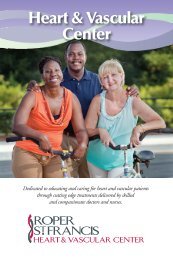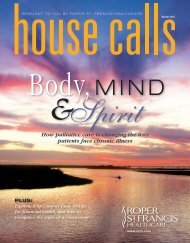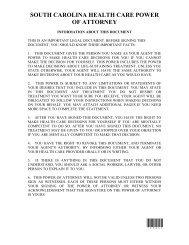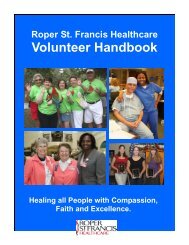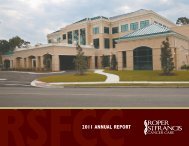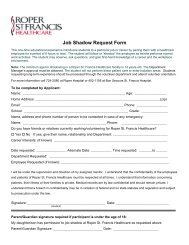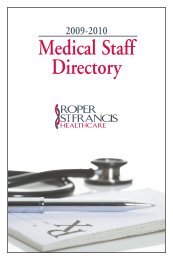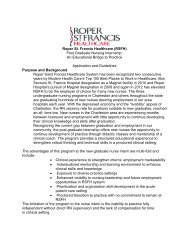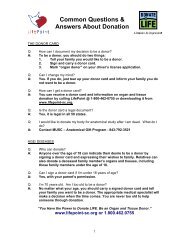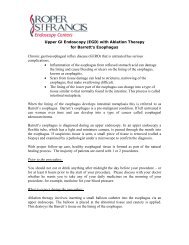Fall 2008, Boost Your Health - Roper St. Francis Healthcare
Fall 2008, Boost Your Health - Roper St. Francis Healthcare
Fall 2008, Boost Your Health - Roper St. Francis Healthcare
Create successful ePaper yourself
Turn your PDF publications into a flip-book with our unique Google optimized e-Paper software.
PART 3: PREVENTION & TREATMENTPreventing PrimaryHypertensionYou’ll recall that primary hypertension, whichaccounts for 90 to 95 percent of high bloodpressure cases, develops due to a combinationof factors—many which you can control.“Lifestyle choices such as maintaining a healthyweight, nutritious diet, and regular exercise habitscan prevent or delay this condition and will also benecessary to treat hypertension that has alreadydeveloped,” says <strong>St</strong>ephen Busby, MD, a Johns Islandfamily medicine doctor affiliated with <strong>Roper</strong> <strong>St</strong>.<strong>Francis</strong> <strong>Health</strong>care. Here, we’ll detail several of themost important steps that you can take to keep yourblood pressure healthy. EXERCISE REGULARLY. According to the AmericanHeart Association, less active people are 30 to 50percent more likely to develop hypertension. “Irecommend that my patients get 30 minutes of aerobicexercise every day,” says Dr. Busby. Althoughflexibility and strength training are important for overallhealth, aerobic activities—those that increase yourheart and breathing rates—are the ones mostimportant for controlling blood pressure. If you don’thave time for a daily swim or jog, make householdchores count by scrubbing the tub with extra vigor orpicking up the pace as you mow the lawn. FOLLOW A HEALTHY EATING PLAN. The AmericanHeart Association recommends a diet rich in fruits,vegetables, and whole-grain, high-fiber foods, as wellas low-fat dairy products, legumes, lean meats, andpoultry. Aim to eat two servings of fish a week,especially those such as salmon and albacore tuna thatare high in omega-3 fatty acids. Aren’t sure whetheryour eating habits qualify as healthy? Keep a food diaryfor at least a week, writing down what you eat, howmuch, when, and why. Once you’re finished, analyzeit closely, referencing a personalized food pyramidsuch as those found at www.mypyramid.gov. CUT BACK ON SODIUM. One of the most importantthings you can do for your blood pressure is reduceyour sodium intake, says Dr. Busby. The DietaryGuidelines for Americans recommend that adultsconsume less than 2,400 milligrams of sodium eachday—that’s about six grams or one teaspoon of tableThe Dietary Guidelines for Americans recommendthat adults consume less than 2,400 milligrams ofsodium each day—that’s about six grams or oneteaspoon of table salt.salt. “However, about half of people are ‘sodiumsensitive,’ meaning that sodium has an even greatereffect on their blood pressure,” says Dr. Busby. “Thisgroup of people, who should consume less than 1,500milligrams a day, often includes African Americans,people over age 50, and those with chronic conditionslike heart disease, kidney disease, or diabetes.”Keep sodium levels in check by reading yournutrition labels—even “health” foods like vegetablejuices can have high amounts—and seasoning withherbs and spices instead of salt. Also aim to get 3,500milligrams a day of potassium, a mineral found infruits and vegetables that helps balance the sodiumin your cells. SHED EXCESS FAT. “To prevent hypertension orlower blood pressure, the most important thing anoverweight person can do is slim down,” advises Dr.Busby. Because “belly fat” is particularly detrimental toblood pressure, men should generally aim to keeptheir waistlines at 40 inches or less while womenshould shoot for 35 inches or less.If you’ve been sedentary for years, you’ll likelyexperience lowered blood pressure within weeksof getting active. STAY AWAY FROM TOBACCO PRODUCTS. If you usetobacco frequently, you could be damaging yourarteries and causing blood pressure to remain highthroughout the day. KEEP STRESS IN CHECK. To protect your blood vesselsfrom the cumulative effects of too much stress,try to identify any sources of anxiety and then determinehealthy ways to cope with them. Physical activityis a great stress-buster, while deep-breathing exercises,meditation, and more sleep can also be verybeneficial. LIMIT ALCOHOL INTAKE. Dr. Busby recommendssticking to amounts considered moderate: two drinksa day for men under age 65 and one a day for men65 or older and women of all ages.Preventing SecondaryHypertensionSecondary hypertension is a bit harder to ward off,as it is often caused by an underlying condition suchas kidney or heart disease. However, Dr. Busbynotes, “A healthy lifestyle can help you avoid someof these ailments.” Weight loss, for instance, canprevent or reduce your risk of sleep apnea, whilereducing alcohol intake lessens your chance of32 house calls




